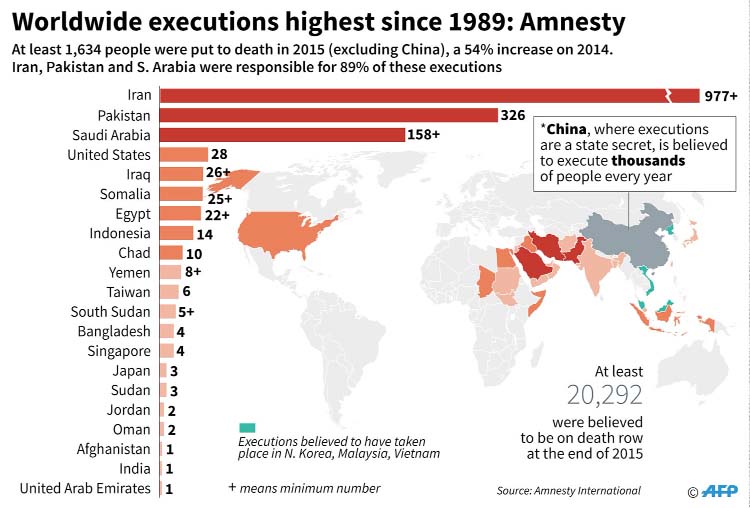
AFP, Barlin :
The number of known executions worldwide went up by more than 50 percent last year to at least 1,634, the highest figure recorded since 1989, Amnesty International said on Wednesday.
The surge was largely fuelled by Iran, Pakistan and Saudi Arabia, the London-based human rights organisation said in its annual report on death sentences and executions worldwide.
The 1,634 figure does not include China, which is thought to have killed thousands of its own citizens.
Death penalty data is “treated as a state secret” by Beijing, Amnesty said, as it is by Vietnam and Belarus.
Recorded executions were up by 54 percent on 2014’s figure of 1,061.
Some 89 percent of those executions were carried out by Iran, Pakistan and Saudi Arabia alone.
“The rise in executions last year is profoundly disturbing,” said Amnesty secretary general Salil Shetty.
“Not for the last 25 years have so many people been put to death by states around the world.
“Iran, Pakistan and Saudi Arabia have all put people to death at unprecedented levels, often after grossly unfair trials. This slaughter must end.
“Thankfully, countries that execute belong to a small and increasingly isolated minority.”
Pakistan lifted a six-year moratorium on the death penalty following the Peshawar school attack in December 2014.
It executed 326 people in 2015, while Saudi Arabia put 158 people to death.
Iran executing at least 977 people is at odds with its opening up to the West after striking a deal with world powers last year on its nuclear ambitions, Amnesty said.
“Western countries are starting to build commercial ties and trade missions,” said James Lynch, Amnesty’s Middle East and North Africa deputy director.
“However, human rights has been absolutely left in the margins,” he told AFP. “That risks undermining all these efforts.”
He said that since the mid-1980s, around half of those people executed in Saudi Arabia have been foreigners, largely migrant workers who did not speak Arabic and who had little legal assistance.
For the first time ever, the majority of the world’s countries have abolished the death penalty for all crimes.
Fiji, Madagascar, Republic of Congo and Suriname fully abolished the death penalty in 2015, taking the total number of countries to do so to 102.
In China, Amnesty said there were signs that the number of executions has decreased in recent years, but it could not verify this.
In August, nine crimes were removed from the list of offences punishable by death, bringing the total down to 43.
“We’ve been urging the Chinese government to come clean for years,” Nicholas Bequelin, Amnesty’s East Asia regional director, told AFP.
The number of known executions worldwide went up by more than 50 percent last year to at least 1,634, the highest figure recorded since 1989, Amnesty International said on Wednesday.
The surge was largely fuelled by Iran, Pakistan and Saudi Arabia, the London-based human rights organisation said in its annual report on death sentences and executions worldwide.
The 1,634 figure does not include China, which is thought to have killed thousands of its own citizens.
Death penalty data is “treated as a state secret” by Beijing, Amnesty said, as it is by Vietnam and Belarus.
Recorded executions were up by 54 percent on 2014’s figure of 1,061.
Some 89 percent of those executions were carried out by Iran, Pakistan and Saudi Arabia alone.
“The rise in executions last year is profoundly disturbing,” said Amnesty secretary general Salil Shetty.
“Not for the last 25 years have so many people been put to death by states around the world.
“Iran, Pakistan and Saudi Arabia have all put people to death at unprecedented levels, often after grossly unfair trials. This slaughter must end.
“Thankfully, countries that execute belong to a small and increasingly isolated minority.”
Pakistan lifted a six-year moratorium on the death penalty following the Peshawar school attack in December 2014.
It executed 326 people in 2015, while Saudi Arabia put 158 people to death.
Iran executing at least 977 people is at odds with its opening up to the West after striking a deal with world powers last year on its nuclear ambitions, Amnesty said.
“Western countries are starting to build commercial ties and trade missions,” said James Lynch, Amnesty’s Middle East and North Africa deputy director.
“However, human rights has been absolutely left in the margins,” he told AFP. “That risks undermining all these efforts.”
He said that since the mid-1980s, around half of those people executed in Saudi Arabia have been foreigners, largely migrant workers who did not speak Arabic and who had little legal assistance.
For the first time ever, the majority of the world’s countries have abolished the death penalty for all crimes.
Fiji, Madagascar, Republic of Congo and Suriname fully abolished the death penalty in 2015, taking the total number of countries to do so to 102.
In China, Amnesty said there were signs that the number of executions has decreased in recent years, but it could not verify this.
In August, nine crimes were removed from the list of offences punishable by death, bringing the total down to 43.
“We’ve been urging the Chinese government to come clean for years,” Nicholas Bequelin, Amnesty’s East Asia regional director, told AFP.

